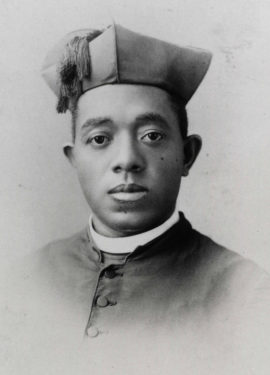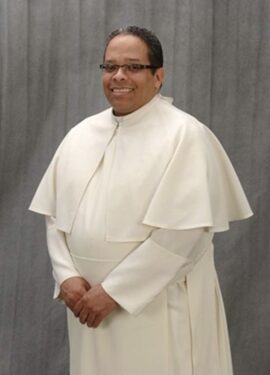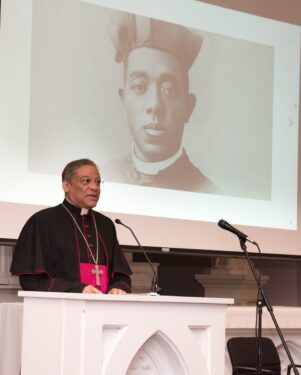
WINDSOR TERRACE — According to Merriam-Webster Dictionary, the first known use of the word “multiculturalism” — referring to the racial and ethnic diversity of a nation or culture — was in 1957. About a century earlier, was the birth of a person who would define multiculturalism in his priestly duties ministering to people of all races.
Father Augustus Tolton, born a Missouri slave in 1854, was the first publicly known black Roman Catholic priest in the United States. Entrenched racism kept him from attending seminary in the U.S., so he was sent to Rome for education and received his ordination there in 1886. Seven years later, he founded St. Monica Parish on Chicago’s South Side.
This parish became the church home for Catholics, black and white, rich and poor, a half-century before the Civil Rights Movement began in the early 1950s. Parishioners loved Father Tolton’s eloquent teaching of the Gospel, beautiful singing voice, and humble sharing of God’s love for all humanity. He died at age 43 in 1897.
In 2010, The Archdiocese of Chicago, inspired by this legacy, requested Father Tolton’s cause for canonization. Pope Francis declared him “venerable” nine years later.
While awaiting beatification, the priest’s supporters have created the Tolton Spirituality Center to help Catholics learn from his examples.
“Father Tolton was a suffering servant because of the color of his skin,” said Rev. Canon A. Gerard Jordan, the new center’s inaugural executive director.
“But,” Father Jordan added, “when black parishioners saw this man coming down the aisle, with a white-collar around his black neck, they knew, ‘I can thrive in my faith. If this man can do it, so can I.’ Now that’s church.”

Funding for the Tolton Spirituality Center comes from a $1 million grant awarded by the Thriving Congregations Initiative of Lilly Endowment Inc. The pharmaceutical giant, Eli Lilly & Company, created the Indianapolis-based endowment in 1937.
“We are quite pleased that Lilly Endowment saw value in this dream of local lay Catholics to assist participating parishes in drawing upon the inspiration of Father Augustus Tolton,” said Chicago Auxiliary Bishop Joseph Perry. He is the postulator of Tolton’s canonization cause.
Bishop Perry has called Father Tolton a “priest-pioneer of reconciliation.”
“We look forward to the next several years of programming with Father Tolton’s blessing,” the bishop said.
The five-year grant helps the center provide online seminars on how Catholics and their parishes can work toward cultural unity through spiritual renewal, restoration, and reconciliation.
Father Jordan said those ingredients aptly define the life of Father Tolton and those of the five other black Catholics in the U.S. nominated for sainthood: Pierre Toussaint, Mother Mary Elizabeth Lange, Henriette Delille, Julia Greeley, and Thea Bowman.
These six candidates are featured in the center’s online program, “The Suffering Servants of Faith.” Their stories “connect with our past and the relevant concerns of today,” Father Jordan said.
Another program from the center will be “Tolton’s Legacy: A Roadmap to Unity.”
“If you want to reach the racist in your pew,” Father Jordan asked, “what do you have to do? Well, you have to have renewal, restoration, and reconciliation.”
These two “pilot programs” were developed before the new center came to exist. Still, they are the foundation for future programming, Father Jordan said.
All programs will be available via video conferencing to participants virtually anywhere. Other tasks at hand are building a website for the center and hiring its full-time staff.
Father Jordan, recently assigned to Lafayette, Louisiana, previously worked with Bishop Perry in Chicago and assisted with Father Tolton’s cause for sainthood.

From that association grew their vision to share Father Tolton’s examples with parishes that hunger for spiritual renewal and growth. Subsequently, they developed the pilot programs that now provide the foundation for the new center.
That need became evident when six historically black Chicago parishes merged into one after COVID-19 restrictions worsened the already declining Mass attendance. The new center aims to show parishes how they can avoid merging again and thrive spiritually on their own, Father Jordan said.
“That was Tolton’s legacy,” he added.
He described how Father Tolton started St. Augustine’s Mission Society for black Catholics who were allowed to meet in the basement of St. Mary’s church. But he wasn’t content to stop there.
“He said, ‘We’re going to flourish and rise up out of this basement,’ and that is exactly what they did,” Father Jordan said.
The result was St. Monica’s Catholic Church and its congregation of people from diverse cultures and economic backgrounds.
“They had the first multicultural church in Chicago,” Father Jordan said. “It existed before the word ‘multicultural’ was ever spelled out.
“Now, if that is not flourishing, I don’t know what is.”
Father Jordan is friends with Father Alonzo Cox, coordinator of the Vicariate of Black Catholic Concerns for the Diocese of Brooklyn. In 2018, Father Cox helped bring a live theatre production to the diocese about Father Tolton’s life.
Father Cox praised the new center, calling it a great vehicle “to help parishes look at ways they can grow in the midst of COVID.”
“I think it could really benefit a parish here in Brooklyn,” he said. “And, it doesn’t have to be a predominately African American parish to benefit from the story of Father Tolton.”
Father Jordan said the center plans to develop programming tailored to different regions in the U.S. He explained, for example, that housing is a concern for black Catholics everywhere. But in Chicago, the problem is affordable housing, and in Lafayette, dilapidated, unlivable housing is the problem.
Using the example of Father Tolton, Catholics can prayerfully seek solutions and build partnerships to achieve them. The Gospel shows the way, according to Father Jordan.
“So we each have a housing problem and a poverty problem,” he said. “But although they come in different forms, what is the same is Jesus Christ and his Gospel. It’s the same everywhere.”
